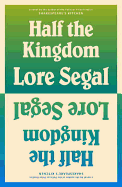
| Publisher: | Melville House | |
| Genre: | Psychological, Fiction, Literary | |
| ISBN: | 9781612193021 | |
| Pub Date: | October 2013 | |
| Price: | $23.95 |
| Starred | Fiction |
by Lore Segal
Half the Kingdom is a tour de force for Lore Segal, the 85-year-old novelist and Pulitzer finalist (for 2007's Shakespeare's Kitchen). It can be appreciated from several points of view: as a serious indictment of the American medical system, a scathing commentary on the marginalization of the elderly or a sendup of sociological and medical "studies." It is all of the above--and a wicked good story as well.
Doctors at a Manhattan hospital have noticed a strange increase in patients presenting with Alzheimer's or dementia. Is it coincidence or a terrorist plot? The phenomenon must be investigated, and none better than Joe Bernstine to lead the study.
Joe, who's returned to New York with his wife, Jenny, after retiring from a Connecticut think tank, is currently concerned about end-of-the-world scenarios--concerned to the point of paranoia. He enlists his daughter, Bethy, and Benedict, the son of an old friend, to work with him. Computer whiz Al Lesser is the next hire; Lucy, an emphysemic, "barely e-mail literate" 75-year-old, rounds out the team.
Each of these characters has a story--as do all the patients they are interviewing--and Segal combines laughter and tears, pathos, real tragedy and comic relief in everyone's scenario. She never trivializes or makes fun of the very real pain and confusion these people are feeling. As meetings are called and canceled, medication given and withheld, all these disparate lives converge in the hospital's ER.
Segal's novel is a beautiful, down-to-earth tragicomic meditation on age, failing powers and the loss that comes to all of us. --Valerie Ryan, Cannon Beach Book Company, Ore.
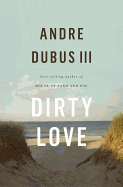
| Publisher: | W.W. Norton | |
| Genre: | General, Fiction, Literary | |
| ISBN: | 9780393064650 | |
| Pub Date: | October 2013 | |
| Price: | $25.95 |
| Fiction |
by Andre Dubus III
There is no one better to write about life's disillusionments than Andre Dubus III, author of House of Sand and Fog. The four tales in Dirty Love are connected by geography and walk-ons by characters from one story to another. In "Listen Carefully, Our Options Have Changed," a husband is blindsided and heartbroken by his wife's adultery after 25 years of marriage. What follows is the slow revelation of his own controlling nature. "All you do is criticize me!" she says. "You made me do it!" He tells her to write a letter to her lover telling him that it's over. She says she will, but she doesn't.
In "Marla," a young, lonely, overweight bank teller meets a man, moves in with him and finds he is a neat freak addicted to computer games--and that she really doesn't love him. Still, Marla pretends to try. "The Bartender" is an aspiring poet--who hasn't written a word for quite a while. He has a pregnant wife he can't stop cheating on, even when she's in the hospital delivering their premature baby. "Dirty Love" is about a 17-year-old girl, Devon, whose life is forever changed when pictures of her servicing a boy make the rounds. Eventually she "meets" a damaged Iraq vet online, falls instantly in love and goes to live with him in a trailer in the woods.
The dead ends, loss of innocence and hope all of Dubus's characters incur and endure by looking for love in all the wrong places, or expecting lust to do the work of love, are heartbreaking in their truth and intimacy. Dirty Love illuminates all the secret hiding places within the heart and soul. --Valerie Ryan
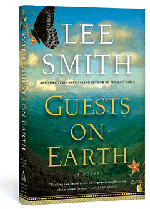
| Publisher: | Shannon Ravenel/Algonquin | |
| Genre: | General, Fiction | |
| ISBN: | 9781616202538 | |
| Pub Date: | October 2013 | |
| Price: | $25.95 |
| Fiction |
by Lee Smith
When the reader first meets Evalina Toussaint, protagonist of Guests on Earth, it is on a note of self-deprecation: this is not her story, she tells the reader, but an account of her impressions of the famous Zelda Fitzgerald. Evalina and Zelda were both patients in Highland Hospital, site of the catastrophic 1948 fire that claimed the lives of Zelda and eight other women in the psychiatric facility. But as Evalina recounts the details of her life--from lush New Orleans to Highland Hospital in North Carolina and beyond--what becomes apparent is that while Zelda plays a central role in the novel, Guests on Earth is nonetheless Evalina's story. As Evalina struggles with conflicting desires--art on the one hand, and domestic security on the other--it becomes apparent that for her, Zelda Fitzgerald serves as a dark mirror, revealing the fate that awaits a talented, sensitive woman in a milieu where such desires may be perceived as madness.
Evalina is 13 when tragedy upends her life. Her mother, a beautiful exotic dancer in New Orleans, seems to find happiness with a much older, wealthy married man, and Evalina lives a comfortable life. But soon calamity strikes, with the death of her mother. Paralyzed with grief, Evalina finds herself at the mercy of an elegant society that considers her outcast, and she's soon shipped off to Highland Hospital for treatment. It is there that she first encounters the charismatic Dr. Carroll and his wife, and meets Zelda Fitzgerald, who is destined to be a lifelong, if intermittent patient. The doctor, nicknamed "Dr. C" by his patients, prescribes shock treatments for many patients, but also has a philosophy that involves an active, creative life for the mentally ill as a form of rehabilitation. However, for women, creative aspirations are purposely limited. Dr. C believes the women in his care should not entertain "unrealistic ambitions," and must be "re-educated toward femininity, good mothering, and the revaluing of marriage and domesticity."
These ideas meet fierce if metaphorical opposition from Zelda, who one day shocks Evalina by viciously destroying a paper doll after Evalina proclaims it a princess in a tower. Zelda tells the distressed girl, "It is far better to be dead than to be a princess in a tower, for you can never get out once they put you up there, you'll see." Her words could be seen as literally prophetic--for Zelda herself will die confined to the upper floors of Highland Hospital--but are also meant as a warning to Evalina against less tangible dangers. Tragically, as the story unfolds, it becomes clear that Evalina is not equipped to recognize these dangers in her life, much less meet them effectively. For if even the passionate and strong-willed Zelda must continually capitulate, what chance can there be for Evalina?
Yet even at the heart of Dr. C's treatments, there is a paradox: his wife is teaching Evalina to play piano, and hopes to see Evalina take the stage as a professional pianist. As in real life, Guests on Earth declines to make villains or heroes of any character, instead presenting a nuanced picture of the challenges women faced in the 1940s South. Likewise, while the idea of F. Scott Fitzgerald as an oppressor of his wife's creativity does loom, he is depicted as much a prisoner of his time, in some ways, as Zelda. Perhaps for that reason Fitzgerald is permitted to contribute the title of the book--"guests on earth" being his own sobriquet for the insane, in a letter to his daughter, Scottie.
Evalina grapples with this complexity throughout the novel, with heroic if doomed determination. She desires all the things that her culture declares a woman should want--marriage, a home, motherhood. At the same time, there is a compulsion in Evalina for the shadow half: untamed sexuality, travel and art. She is not the only one, and nor is Zelda: Highland Hospital is populated with an array of compelling women who in one way or another are ravaged by this gender-specific dichotomy.
In particular, Evalina's friend Dixie is attracted to the glamour of embodying the quintessential Southern belle, but crumples from the societal pressure. Through the story of Dixie, Smith explores the extraordinary challenges that were unique to Southern women even as late as the mid-20th century, beyond what the received wisdom of 18-inch waists and womanly decorum would allow.
Above all, Smith lures the reader with lush prose, evocative settings and a voice that is distinct from the beginning. Through Evalina's eyes and the richness of her experience, Smith explores the unnamed border country that lies between sanity and madness, joy and heartbreak. --Ilana Teitelbaum
Watch the trailer for Guests on Earth here.
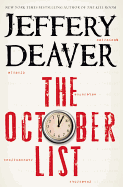
| Publisher: | Grand Central | |
| Genre: | General, Crime, Suspense, Fiction, Thrillers | |
| ISBN: | 9781455576647 | |
| Pub Date: | October 2013 | |
| Price: | $26 |
| Mystery & Thriller |
by Jeffery Deaver
In the foreword to The October List (or is it the afterword, since it's at the back of the book?), Jeffery Deaver explains that he got the idea to tell his thriller story backward after hearing Stephen Sondheim discuss the musical Merrily We Roll Along, which unfolds in reverse order. (Other inspirations he cites include the movie Memento and a Seinfeld episode titled "Betrayal," both told in a "fractured time line.")
The novel begins with the last chapter, as a woman named Gabriela sits in a Manhattan apartment on a Sunday, awaiting news from people who have gone to negotiate with a kidnapper for her daughter's release. The kidnapper apparently wants something called the October List, plus half a million dollars, in exchange for Gabriela's child. Someone bursts through the apartment's front door, but it's not the person Gabriela is expecting, and the chapter ends with her seemingly in even worse trouble.
Each chapter that follows takes place a few minutes or hours before the preceding one, going back to the previous Friday morning. Even the pages are numbered in reverse order, with the title page at the end. The premise is clever, but Deaver's ability to execute it successfully makes this experimental novel even more impressive. Revealing the ending first, he still manages to surprise with a few twists, constantly challenging readers' understanding of the story. Read it backward, forward, once or twice, to see how all the pieces fit together--just be sure to chase down this List yourself. --Elyse Dinh-McCrillis, crime-fiction editor, The Edit Ninja
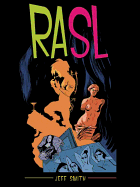
| Publisher: | Cartoon Books | |
| Genre: | Science Fiction, Comics & Graphic Novels | |
| ISBN: | 9781888963373 | |
| Pub Date: | September 2013 | |
| Price: | $39.95 |
| Graphic Books |
by Jeff Smith, illust. by Jeff Smith
Jeff Smith's compelling RASL is a science fiction noir graphic novel that simultaneously pays homage to 19th-century novels and explores our discomfort with modern warfare.
Robert Johnson, aka RASL (pronounced "razzle"), is a scientist, art thief and serial lover--a composite of Prometheus, Dr. Frankenstein, James Bond, Clint Eastwood and, at least with his distinctive nose, Smith himself. Together with his colleague Miles, RASL works on a project to implement Nikola Tesla's theories on free energy to intercept ballistic missiles and track terrorist activities. When RASL reads Tesla's lost journals and discovers a fatal flaw in the plans, he shuts down the project to become a fugitive drifting between multiple universes while pursued by Sal, a lizard-faced assassin with the tenacity of Inspector Javert.
During his harrowing flight through the multiverse, RASL repeatedly loves and loses many versions of his beloved. His women have significant Hebrew and Hindu names: Maya (illusion); Anne (prayer/grace); Uma (goddess-brightness). His ephemeral yet literally transcendent relationships with these women explain his acronymic nickname: romance-at-the-speed-of-light. Smith interlaces scientific allusions with sly yet resonant dialogues on power, monotheism, colonialism and the effects of war on the environment. At the core of this rich and inventive work lies a very current dilemma: How do we balance our global needs with national interests or individual desires? --Thuy Dinh, editor, Da Mau magazine

| Publisher: | Avery | |
| Genre: | ||
| ISBN: | 9781583334737 | |
| Pub Date: | October 2013 | |
| Price: | $35 |
| Food & Wine |
by Robin Quivers
Robin Quivers, best known as Howard Stern's sassy sidekick, has had a very public struggle with her weight and her body; for years, she assumed that her chronic aches were a genetic "birth right." However, once she gave up all animal products, processed foods, refined flours and sugar, the quality of her energy, sleep and mood improved so drastically she felt compelled to share the results of her "commitment to feeling good" in The Vegucation of Robin. "First I'm going to help you understand how food affects the way your body works, looks, and feels," she writes. "Then I'm going to show you which foods hurt and which foods heal. So by the time you get to the amazingly delicious, soul-quenching, lip-smacking, tummy-full-of-goodness recipes I've collected for you, you'll be ready to look at the meals you eat in a whole new light."
Quivers provides food for thought as well, with information on the junk food and pharmaceutical manufacturers who fund the medical establishment and nutrition boards--and how their money affects the advice these experts give us. Once she's made her case for embracing a life of vegetables and grains, Quivers provides nearly 100 recipes for homemade juice, soups, salads and vegetable dishes. She also includes appendices outlining how to prepare certain vegetables--as well as the best seasons in which to find them. Quivers's enthusiasm is infectious, and her Vegucation would be a great gift for any loved one looking to embrace a healthier lifestyle. --Kristen Galles, blogger at Book Club Classics
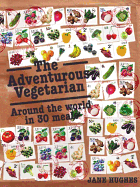
| Publisher: | New Internationalist | |
| Genre: | Regional & Ethnic, Cooking, International, Vegetarian & Vegan | |
| ISBN: | 9781780261249 | |
| Pub Date: | October 2013 | |
| Price: | $25 |
| Food & Wine |
by Jane Hughes
The Adventurous Vegetarian showcases the global momentum of the vegetarianism movement. Jane Hughes, editor of the Vegetarian magazine and tutor at the Cordon Vert, hopes to "make it possible for vegetarians, wherever they may be, to sit down to a meal similar to that which might be on the table in a vegetarian household on the other side of the world." To accomplish this goal, she found contributors from 30 countries to offer appetizers, entrees and desserts that translate the shared principles of vegetarianism into an international cornucopia of recipes.
The use of "adventurous" in the title is apt--many ingredients are not found in a Western diet, and even experienced chefs will find challenges among these selections. While remaining true to the spirit of each recipe, Hughes occasionally replaces some techniques or ingredients. In Togo, for example, the making of fufu is traditionally a communal task, with the strongest members of the community taking turns pounding starchy vegetables with a large stick; for solitary Western cooks, Hughes substitutes polenta.
Beginners, however, will find success with many of the simpler offerings--the Chinese ABC soup contains just six ingredients and can be completed in 30 minutes. Hughes believes this cookbook is more about "letting the world come to you" and less about travel--but the brief history of each country's cuisine, links to helpful websites and advice for finding vegetarian fare would be beneficial to travelers as well. Even carnivorous foodies will enjoy this survey of vegetarianism. --Kristen Galles from Book Club Classics
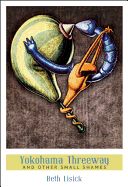
| Publisher: | City Lights Books | |
| Genre: | General, Humor, Form, Biography & Autobiography, Entertainment & Performing Arts, Essays, Personal Memoirs | |
| ISBN: | 9780872866256 | |
| Pub Date: | September 2013 | |
| Price: | $14.95 |
| Starred | Biography & Memoir |
by Beth Lisick
Writer and performer Beth Lisick is both significantly stranger and more self-aware than the average person. She is also very funny, and in Yokohoma Threeway, she combines these characteristics to create a detailed catalogue of her transgressions, from hip exploits in alternative Berkeley to the most quotidian of human dilemmas. It's as though there are two Lisicks: one who throws napkins at obnoxious strangers and spars with children, and another who is forever floating above the scene, judging, recording, smirking and smiling.
While Yokohama Threeway maintains the levity of Lisick's prior work, including the comic memoir Everybody into the Pool, it stirs up legitimate questions about the nature of remorse. Some of her shames are accidental and public, such as a skirt caught in her underwear at a work party. Some are intentional and private, as in the tacky sexual exploit that gives this book its title. It raises the question: Do intent or secrecy affect shame's impact? Does one sting more, or last longer? In one story, Lisick blows off a condescending mother who's attempting to hire her to lead a children's book club. Here, the embarrassment of behaving rudely is mingled with the pride of standing one's ground.
Reading through Lisick's shames, it's easy to reminisce on our own. It's not nearly as easy, however, to spin each story with the uplifting wit that she brings to her writing. --Annie Atherton
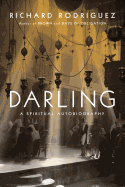
| Publisher: | Viking | |
| Genre: | Sociology of Religion, Biography & Autobiography, Social Science, Religious, Personal Memoirs | |
| ISBN: | 9780670025305 | |
| Pub Date: | October 2013 | |
| Price: | $26.95 |
| Biography & Memoir |
by Richard Rodriguez
Richard Rodriguez's Darling is everything his fans have learned to love: an urbane, witty, sensual meditation on race, religion, sexuality and mortality at the beginning of the 21st century.
Rodriguez tackles many themes, and visits many places, in these personal and provocative essays. (The title essay is a long love song to the women in his life and their spiritual influence, including a profound friendship with one in particular.) As a gay Catholic, he is particularly discerning and touching about his relations with the church he will not leave, even as its hierarchy marginalizes people like him. He captures perfectly how he finds succor and sustenance in Catholic ritual and his fellow faithful--but also how blatantly wounding the church's teachings on sexuality and gender can be. Rodriguez's defense of the right to love those whomever his heart calls him to love is brave, compassionate and inspired.
In addition to the ample breadth of subject matter, Rodriguez's writing style is particularly noteworthy. He is, quite simply, one of the finest prose stylists now writing in English. These essays are discursive gems; there is a subtle musicality to each sentence that adds to his sophisticated and compassionate vision. These are essays pregnant with grief and longing and no less uplifting for that, wonderful and articulate 'good byes' to friends now gone--and a sad but beautiful look into Rodriguez's own encroaching mortality. --Donald Powell, freelance writer
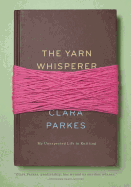
| Publisher: | Stewart, Tabori, & Chang | |
| Genre: | Needlework, Crafts & Hobbies, Knitting | |
| ISBN: | 9781617690020 | |
| Pub Date: | September 2013 | |
| Price: | $19.95 |
| House & Home |
by Clara Parkes
Knitters and non-knitters alike can find something to like about Clara Parkes's memoir, The Yarn Whisperer. In 22 essays, she blends personal anecdotes with insight about the bigger picture of life in a way that will make readers laugh out loud. Even those who don't know anything about knitting can appreciate her assertion that all knitting stitches should be named after pastries or her observation that many knitter's yarn baskets are as colorful and overflowing as an English garden.
Parkes's stories range from childhood to the present, and show how knitting has shaped her life. We hear about her aunts and college roommates, her life in France and her parents' divorce, her love of mystery novels and how she fixed up a falling-apart farmhouse and made it a home.
Most of her stories relate to a particular knitting stitch, and Parkes shows how that stitch is an example of life, from the introverted purling to how each stitch has to work together to create a cohesive whole. Buying yarn can be as out-of-hand as buying plants in the spring, and a bad stitch can be as disastrous as a bad driver. On the other hand, knitting can bring people together and create an instant bond between strangers.
Parkes's memoir is a humorous look at how yarn can create community and how something you love can apply to everyday life. Her stories have something that everyone can relate to, not matter how much or little one knows about knitting. --Kalee Youngquist, intern, Shelf Awareness
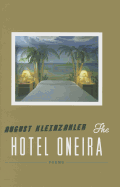
| Publisher: | Farrar, Straus & Giroux | |
| Genre: | General, American, Poetry | |
| ISBN: | 9780374172930 | |
| Pub Date: | October 2013 | |
| Price: | $24 |
| Poetry |
by August Kleinzahler
Unlike many poets of his generation, August Kleinzahler has managed to shun the permanent ivory teaching tower for a quieter existence in California and New Jersey, where he was born in 1949. Influenced by the Beats and jazz, his poetry has always been rough around the edges, off-color, loose stylistically but direct and honest. The Hotel Oneira shows Kleinzahler's age: it's more reflective, more conscious of time.
There's a wistfulness here, a trace of the bittersweet, placidity. Life now is "ardent but fitful." In "Sports Wrap," he writes about a failing baseball team as a "distressing tale" unfolding, "inning by inning, game by game." In "Epistle XXXIX," he envisions his funeral:
"I really was a decent chap, underneath:
kind to dogs, shop clerks--and something of a wit, to boot."
It's no surprise to find a fine, longish poem entitled "The Rapture of Vachel Lindsay," who, like Kleinzahler, was a singing poet. Addressing Lindsay as a "poor little calf," Kleinzahler muses: "You know, don't you, what America will do to you, what truly befalls you."
The final poem, "Traveler's Tales: Chapter 12," might be a serenade:
"The cruise ship heads out of the harbor before dark...
It has all turned out better than we probably dared hope.
It frightens me, just this moment, to say so."
Give this strong, American poetic voice a try. --Tom Lavoie, former publisher
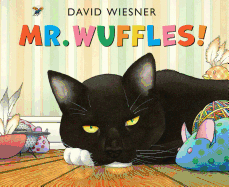
| Publisher: | Clarion | |
| Genre: | Animals, General, Science Fiction, Insects, Spiders, etc., Cats, Juvenile Fiction, Humorous Stories, Comics & Graphic Novels | |
| ISBN: | 9780618756612 | |
| Pub Date: | October 2013 | |
| Price: | $17.99 |
| Starred | Children's & Young Adult |
by David Wiesner
Luckily, curiosity does not kill the cat in David Wiesner's (Tuesday; Flotsam) latest, nearly wordless masterpiece.
The only human presence involves a couple of cameo appearances of the presumed owner, dangling a fish from a thread ("Look, Mr. Wuffles, a new toy!") and later inquiring of the pet, "What's so interesting, Mr. Wuffles?" When the human disturbs the cat from his nap, Mr. Wuffles stalks off, past a trail of unused toys. But wait--one of these is not like the others. From inside a ball-shaped gray structure on three legs, some tiny green beings peer out of a horizontal opening. Wiesner cuts to the interior, where the creatures make sounds of an alien kind, represented by symbols and geometric shapes. Next, the aliens see the green eyes of the cat staring through their window and... topsy-turvy they go. Wiesner cuts back and forth between the two views as the five alien passengers assess the damage, then make a mad dash to safety under a heat register.
In a time-honored tradition of stories that stretch from Gulliver's Travels to The Twilight Zone's "The Invaders," Wiesner's tale juxtaposes a collision of two worlds. Young readers will identify with both Mr. Wuffles, who's aware of a fascinating world undetected by adults, and also with the aliens who face seemingly insurmountable odds laid out by beings much larger than they. The author-artist's ability to toggle between these two viewpoints adds up to a larger whole and a wider perspective, and both sides may win readers' sympathies. A great conversation starter. --Jennifer M. Brown, children's editor, Shelf Awareness
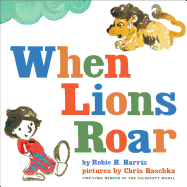
| Publisher: | Scholastic/Orchard | |
| Genre: | Concepts, General, Family, Juvenile Fiction | |
| ISBN: | 9780545112833 | |
| Pub Date: | September 2013 | |
| Price: | $16.99 |
| Children's & Young Adult |
by Robie H. Harris, illust. by Chris Raschka
Robie Harris tackles hot-button topics for preschoolers in ways that show them they can get through anything--topics such as the death of a pet (Goodbye Mousie) and the arrival of a new sibling (Mail Harry to the Moon!). This book speaks to those times when little ones are scared, yet her young hero also finds a way to work through the fear independently.
What might upset a young one? Well, loud noises particularly. "Lions roar," and sometimes "daddies yell" and "mommies holler," too. The child models how he or she chases away "the scary." Caldecott Medalist Chris Raschka (A Ball for Daisy) shows the youngster sitting right down, shutting his or her eyes, going within, and coming back out when "the quiet is back." The child can return to the world and see its beauty: "A flower blooms. An ant crawls by." Harris reminds readers that the scary can and usually will pass.
Raschka’s broad, bold and blurred watercolor brushstrokes evoke the power of fear as it invades a young child's world. As the child shakes off the anxiety, vibrant patterns of red, blue, brown and green add a playfulness to the illustrations. The images jump off the page, like the child's energy, victorious over his or her worries. The effectiveness of the author and artist's teamwork comes through in the spare page layout, the simple, declarative sentences, and bold uncomplicated watercolors that keep the focus on the child's transformation. Harris and Raschka speak to young ones simply and directly. The message is: it will be okay. --Mollie Welsh Kruger, graduate faculty, Bank Street College of Education